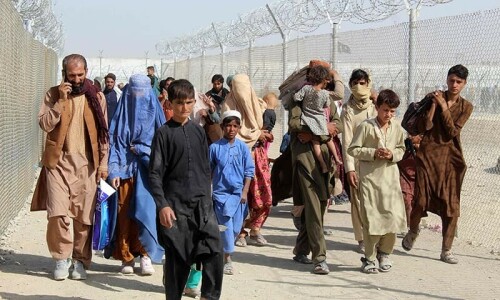PASO CANOAS: Marwa fled Taliban rule in Afghanistan because she wanted to study, work and wear jeans. Now, thanks to Donald Trump’s deportations, she’s detained in the Costa Rican jungle, her life in limbo.
The 27-year-old is one of hundreds of migrants from all over the world who have been expelled by the United States to countries in Central America. Costa Rica, Panama and Guatemala have all agreed to receive migrants from other countries, and to detain them until they are shipped home or moved on.
El Salvador has gone a step further, jailing hundreds of Venezuelans in a maximum-security prison after the United States claimed, without providing evidence, that they are gang members.
Agency spoke to several migrants from a group of about 200, including around 80 children, who are detained at a facility near Costa Rica’s jungle-clad border with Panama. All said they feared for their lives in their homeland.
Marwa said she was terrified at the thought that she, her husband and two-year-old daughter could be sent back to Afghanistan. Her husband Mohammad Asadi, 31, who ran a construction company back home, was threatened by the Taliban for selling materials to American companies.
“I know if I go back, I will die there. I will be killed by the Taliban,” Marwa said in an interview conducted through the centre’s perimeter fence. Alireza Salimivir, a 35-year-old Iranian Christian, said he and his wife face a similar fate. “Due to our conversion from Islam to Christianity… it’s jail or the death penalty for us,” he said.
Since his return to the White House in January, Trump launched what he vowed would be the biggest wave of migrant deportations in American history. He also signed an order suspending asylum claims at the southern border.
Citing pressure from “our economically powerful brother to the north,” Costa Rica said it had agreed to collaborate in the “repatriation of 200 illegal immigrants to their country.” But only 74 of the migrants have been repatriated so far, with another 10 set to follow, according to the authorities.
The rest face an uncertain future. They refuse to be deported to their homelands, but no other country — including Costa Rica itself, which has a long tradition of offering asylum — has offered to take them in.
“We can’t go back, nor can we stay here. We don’t know the culture and don’t speak Spanish,” said Marwa, who said she wanted to be close to relatives “in Canada, the United States or Europe.”
Prison or war
German Smirnov, a 36-year-old Russian former election official, said he fled to the United States with his wife and six-year-old son after blowing the whistle on fraud in last year’s presidential election. He said his request for asylum in the United States was “totally ignored, like it had never existed.”
If returned to Vladimir Putin’s Russia, he said: “They will give me two options, sit in prison or go to war (in Ukraine).” Marwa and her husband also said they wanted to seek asylum in the United States when they arrived at the US-Mexican border earlier this year after a grueling overland journey through 10 countries, starting in Brazil.
Published in Dawn, April 3rd, 2025














































